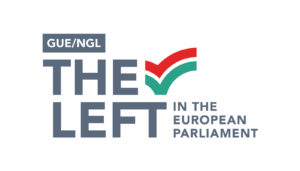The European United Left-Nordic Green Left (GUE/NGL) https://www.guengl.eu/ is the Political Group of the Left in the European Parliament. Today it has 39 MEP’s from parties across 13 member states.
Today GUE/NGL represents in Europe the spectrum that rallies together the forces of the Left to the greatest extent, given that it includes communist, left, progressive and ecological parties from a number of member states. GUE/NGL has a confederal character in its functioning, that is to say the individual parties/delegations participating in the Group can put forth their own positions in cases where they deem it necessary. This confederal character enables parties with different ideological and political positions, historical and national traditions, priorities and sensitivities to coexist within the GUE/NGL. The GUE/NGL brings together those forces that project the vision of a different Europe and oppose the policies governing the EU today, more specifically neoliberalism in the economy, militarism in the EU’s foreign/defense policy and its anti-democratic and non-transparent functioning and structure.
History
The Group of the Left historically has its roots in the Group of Communists and Allies that was operating in the European Parliament before the direct election of MEP’s by the peoples of the member states began in 1979.
In 1989, four parties formed the “European United Left”, while three other Communist Parties (Greece, France and Portugal) formed the group “Left Unity”.
After the 1994 European elections, a process began for the rallying of all the forces of the Left into one Group. Thus, the United Left of Spain, the French Communist Party, the Party of Communist Reconstruction of Italy, the Portuguese Communist Party and the Communist Party of Greece and the Coalition of the Left and Progress of Greece established the Confederal Group of the European United Left (in French: Gauche Unitaire Europé – GUE).
In 1994 the Group grew with the entry of left-wing parties (Sweden, Finland and Denmark) that constituted the separate Nordic Green Left (NGL) platform within the Group, which was renamed with its current acronym GUE/NGL (Greek EEA/ΒΠΑ). In the years that followed, GUE/NGL[1] enlarged successively with other parties joining its ranks.
AKEL joined GUE/NGL as a regular member in 2004, with the accession of Cyprus to the EU and the election of the Cypriot MEP’s.
Positions and Action
GUE/NGL bases its unity and activity around eight core policy areas:
- against neoliberalism and austerity policies, assumption of initiatives to strengthen social and workers rights, concrete measures to combat inequality, poverty and social exclusion, struggle for a minimum income and wages to provide protection from poverty.
- against the privatization of public goods, services and property. Assumption of initiatives to strengthen public property, including cooperatives.
- resistance to the EU’s policies of militarization and interventionism, to the arms race and the assumption of initiatives for disarmament of conventional weapons and weapons of mass destruction.
- combating of tax havens and “black holes”, tax evasion and fraud. Initiatives for greater transparency and the combatting of corruption.
- solidarity with the struggles of the peoples for their right to self-determination, but also the protection of their sovereign rights
- resistance to all kinds of free trade agreements and support to the struggle in favor of fair economic relations between the countries of the South and the major trade alliances.
- combatting of xenophobia and racism, with an emphasis on the need for a European immigration policy based on solidarity.
- support for a feminist Europe with the integration of gender equality. Support for all feminist movements and struggles around the world; against all forms of violence against women.
[1] The Group of the Left (GUE/NGL) should not be confused with the Party of the European Left (PEL – in Greek KEA). The PEL is not a European Parliament Group but a European Political Party that was set up and operates according to the EU legal framework on Political Parties. Only some of the member parties of the Left Group in the European Parliament participate in the PEL. AKEL is not a member of the PEL, but participates in its work with the status of observer.

